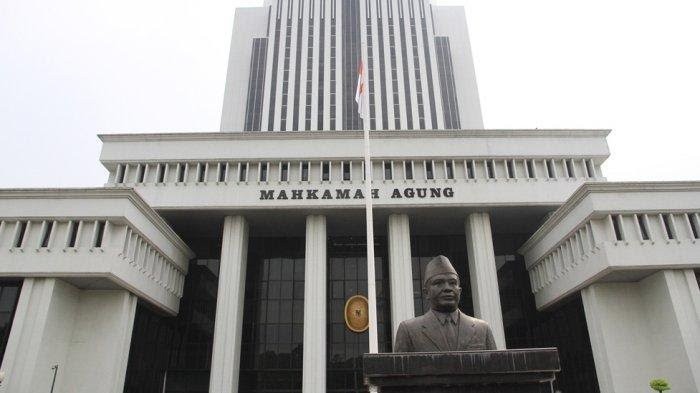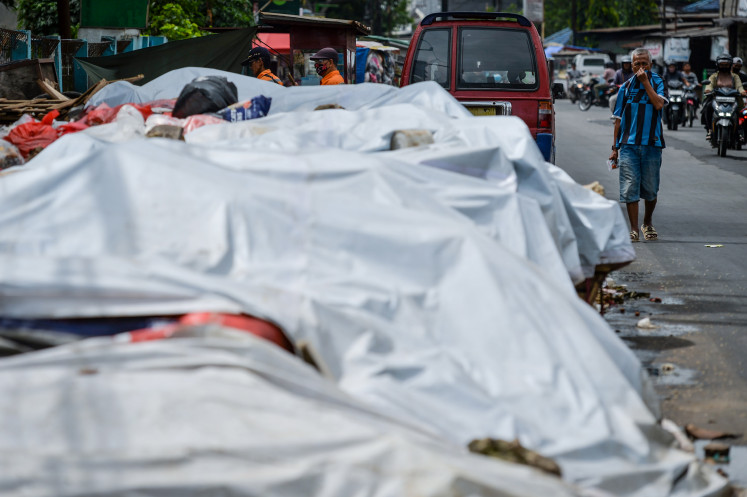Popular Reads
Top Results
Can't find what you're looking for?
View all search resultsPopular Reads
Top Results
Can't find what you're looking for?
View all search resultsSupreme Court sets out graft sentences
Change text size
Gift Premium Articles
to Anyone
T
he Supreme Court has issued a new regulation that encourages judges to sentence those found guilty in high-profile corruption cases that cause massive state losses to life in prison, in a move designed to eliminate years of inconsistent sentencing by the judiciary.
The court issued on July 24 a set of guidelines for punishing graft convicts, which are laid out in Supreme Court Regulation (Perma) No. 1/2020.
The new regulation provides pointers for determining the appropriate punishment for those found guilty of misappropriating state funds for personal gain, as stipulated in Article 2 of the 2001 Corruption Law.
Judges are also advised to hand down appropriate sentences for those convicted of abuse of power or position, as stated in Article 3 of the Corruption Law.
Those accused of violating Article 2 of the law can face between four- and 20-years’ imprisonment, as well as fines ranging from Rp 200 million (US$14,285) to Rp 1 billion, while those found guilty of violating Article 3 will face one to 20 years’ imprisonment and fines of Rp 50 million to Rp 1 billion.
Prior to the regulation, Indonesian corruption court judges often used their own criteria and standards for issuing sentences to graft convicts. With the new set of guidelines, they are expected to mete out punishment based on the size of state losses incurred from the wrongdoing.
Judges must consider handing down the harshest sentence if defendants cause state losses amounting to more than Rp 100 billion, and hand down the minimum if state losses fall between Rp 200 million and Rp 1 billion under Article 2 or less than Rp 200 million under Article 3.
To determine the most appropriate sentence, judges also need to assess the defendants’ level of culpability. Maximum sentences may be meted out against those who initiate the crime, have a significant role in the case, use sophisticated technology to commit a crime or committed the crime during a national disaster or an economic crisis.
“Despite the regulation, judges still need to base their sentencing on principles such as independence, professionalism and accountability,” Supreme Court spokesman Andi Samsan Nganro told The Jakarta Post on Tuesday.
For years, law experts and civil groups have called the Supreme Court to draft sentencing guidelines to prevent inconsistencies in doling out sentences.
Court judges have been criticized for failing to interpret corruption law and meting out inappropriate punishments to graft defendants, reflected in the wide variety of graft sentences among equally culpable convicts.
Such inconsistencies have led law experts and activists to question whether judges can uphold the principles of justice and a fair trial when dealing with corruption cases.
In July last year, judges at the Makassar Corruption Court in South Sulawesi handed former Batugulung village head Muh. Said 2.5 years in prison for embezzling Rp 542 million in village funds between 2015 and 2018.
In a separate but similar case, the Banjarmasin Corruption Court in South Kalimantan found former Hambuku village head Datmi guilty of embezzling Rp 43 million in village funds – Datmi received a harsher four-year sentence.
Many more inconsistencies have been uncovered over the years, but Supreme Court spokesman Andi said that such incidents had provided the court with motivation to issue the strict provisions.
“And we have worked closely with the University of Indonesia’s Judicial Watch Society [MaPPI] since 2018 to formulate the guidelines,” he said.
Trisakti University law expert Abdul Fickar Hadjar applauded the move, saying that he expected that it would not only eliminate disparities in graft sentencing but also prevent judges from misusing their authority – and even accepting bribes – to conspire with defendants.
Zaenur Rohman, a researcher from Gadjah Mada University’s Center for Anti-Corruption Studies (Pukat UGM), expressed appreciation for the court on the one hand, but also criticized the limited scope of the guidelines’ use.
“Judges can only use the guidelines to hand down sentences against violators of Articles 2 and 3 of the Corruption Law. But how about other types of crimes under the same law, like bribery, extortion and gratuity taking?” he said.
“The guidelines are still not perfect.”
Corruption Eradication Commission (KPK) spokesman Ali Fikri also expressed similar concerns to Zaenur, but still believed that the guidelines would put an end to graft-sentencing disparities.
To follow-up the guidelines, the commission is now arranging a list of similar guidelines for KPK prosecutors when indicting graft defendants.
He said guidance was needed because KPK prosecutors also played a significant part in sentencing disparities. At times, they would press different charges and indict differently against equally culpable defendants, which would affect a final ruling by the judge when he or she meted out the punishment.
“We are now in the process of finalizing the drafting of the guide,” Ali said.










